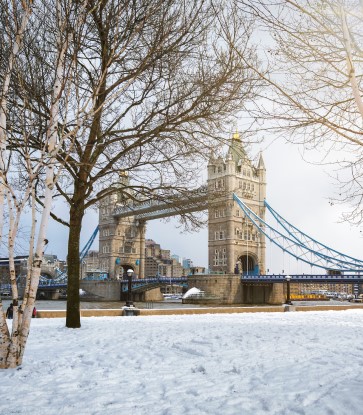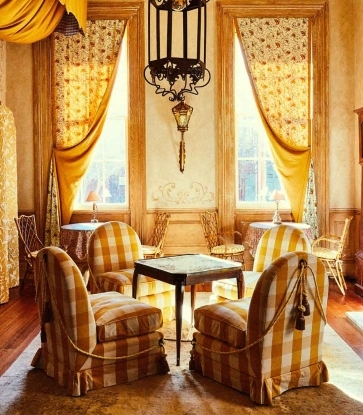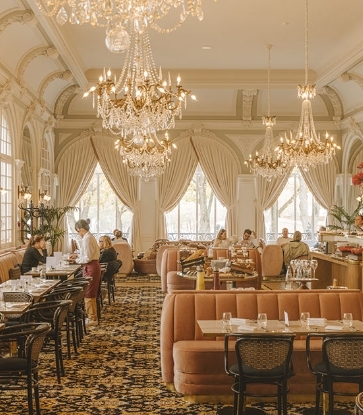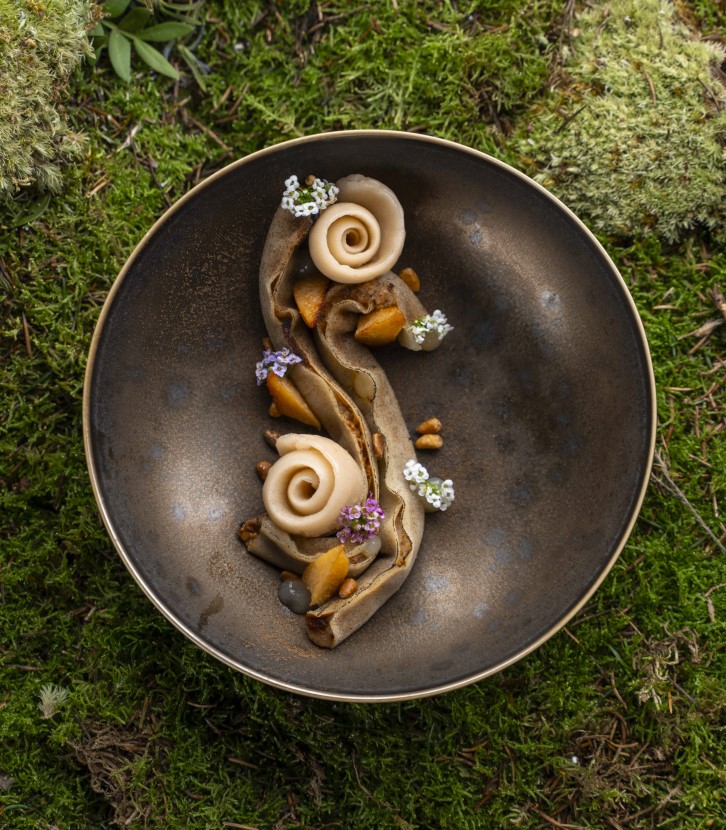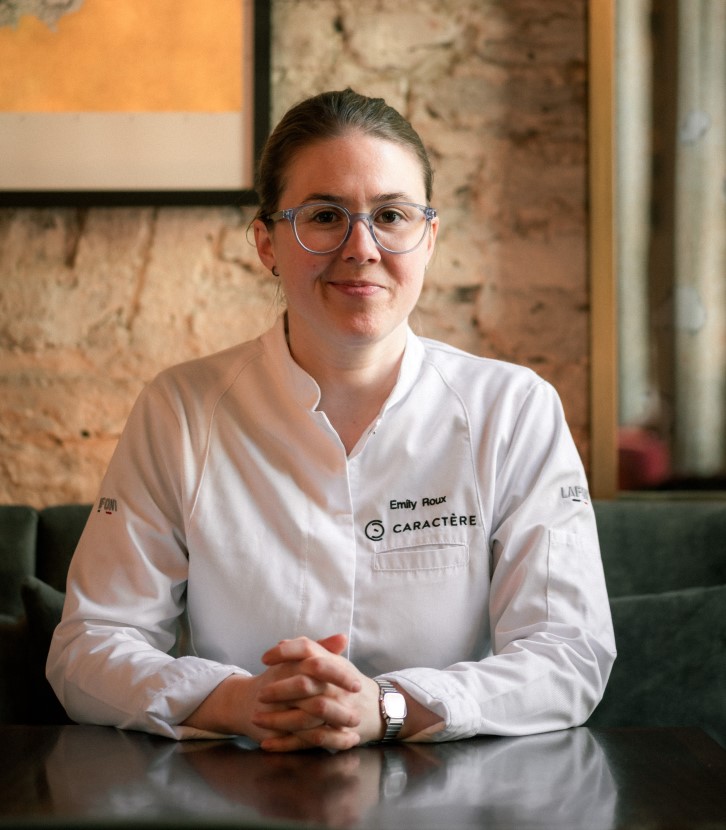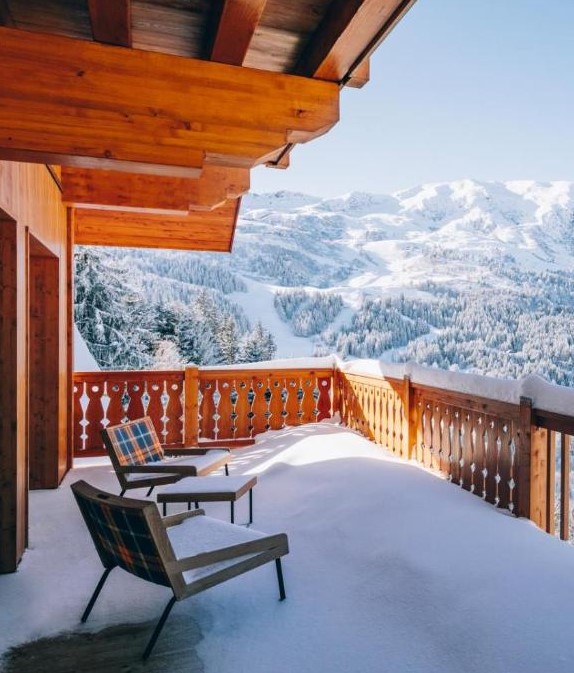The Colony Palms Hotel in Palm Springs sits near the southwestern edge of the Movie Colony, a neighborhood where Hollywood stars once kept homes.
Everything about it seems designed for discretion, at least from the outside. The courtyard entrance is narrow, lined with green treillage and paved with Saltillo tile. The lobby is intimate, appointed with potted palms and clamshell swivel chairs done in lichen-colored velvet. Wander the grounds and you will come upon a series of secluded nooks and fire pits. Outdoor benches and patio chairs are dressed in classic banana-leaf upholstery. Around the pool, most things are striped (chaises, umbrellas, towels). Over in the corner, couples will be soaking in a jacuzzi the shape of a cloverleaf.
In other words, the Colony Palms feels nothing like the other high-end hotels in Palm Springs. In a sea of succulents, midcentury lines, and glass walls, it’s a pocket of old-world glamour—more Hôtel du Cap-Eden-Roc, a MICHELIN Three Key property, than Ace Hotel & Swim Club.



It was built in 1936 by Al Wertheimer, a casino magnate and alleged member of Detroit’s notorious Purple Gang who also ran the Clover Club on Sunset Boulevard. The Colonial House, as it was called then, opened around the time that the studios instituted the “two-hour rule,” which required actors on contract to stay within two hours of Los Angeles should they be needed on set. The rule turned Palm Springs, and the Colonial House, into a convenient refuge. (Guests included Clark Gable, Humphrey Bogart, and Carol Lombard.) If it looked like a sleepy Spanish hacienda, inside it was more of a gambling den. According to local lore, it had an underground speakeasy and brothel that visitors could access via a secret staircase hidden behind a cupboard in the pantry.
The hotel has lived many lives since then. In the 1940s it became Howard Manor, under the ownership of Robert Howard, whose father, the California businessman Charles Howard, owned the racehorse, Seabiscuit. Robert’s wife was the actress Andrea Leeds, and perhaps in a nod to her Oscar-nominated role alongside Katherine Hepburn in “Stage Door,” they named its supper club the Academy Room.

Later, the Howards sold it to their friends, Dave and Annie Margolis, who in turn sold a ten percent share to the heavyweight champion Jack Dempsey. In the 1950s and 1960s, their guest list regularly included Frank Sinatra, Howard Hughes, Ronald Reagan, and Zsa Zsa Gabor.
In the 1970s, as if on cue, it was taken over by Sheila Cluff, a fitness enthusiast and onetime figure skater who owned The Oaks, a destination spa in Ojai where guests subsisted on a 750-calorie-a-day diet heavy on carrot sticks and cottage cheese. Cluff converted Howard Manor into a spa called the Palms, bringing poolside aerobics to the desert.
By the time its current owner, Steve Hermann, got a hold of it in 2020, the Colony Palms had undergone more ownership changes and renovations, and its old-Hollywood vibe had been watered down. “It kind of lost its story line,” Hermann says.



Hermann set out to restore the hotel’s original atmosphere—“more the emotional context of a certain timeline than anything specific,” he explains. Art Deco-inspired details now begin with marble floors in the lobby and continue in the guest rooms, with tufted headboards and gold-leaf wallpaper hand-painted by de Gournay. Where the greenery had become too manicured, Hermann let it luxuriate. This, too, evokes a certain mood. In his words: “What was this place originally? It was an escape. It was an oasis, really. We’re in the desert, and it’s an oasis. So, you walk onto the property and you’re in this oasis environment. It’s really kind of overgrown and comfortable and lush.”
Hermann also gutted the poolside cabana restaurant. When it came time to find a chef, Michael Hung was an early candidate. Hung’s credentials were impeccable—he’d trained at Two MICHELIN Star Daniel and Two MICHELIN Star Aquavit in New York City before joining Traci Des Jardins’s team at Jardinière in San Francisco and, later, becoming chef de cuisine at Roland Passot’s La Folie. More recently he’d been executive chef at Faith & Flower, a Roaring Twenties-inspired spot in downtown L.A. that did not survive the pandemic. Hermann did a tasting with Hung. “I’m a big believer in the experience of something as opposed to what it is on paper,” Hermann says. “He just knocked our socks off.”
Hung explains that his menu at Colony Club keeps to an American-European flavor profile: “I cook Asian food as well as I cook French food, but I don’t put it on the menu here because when you look around, you see the south of France. You see Hollywood Regency.”




